BUSN603 Corporate Governance and Risk Management Case Study Analysis
VerifiedAdded on 2022/12/19
|9
|2214
|34
Case Study
AI Summary
This case study analyzes the corporate governance failures at Terra Australia Bank (TAB) and its financial planning arm (TAFP), focusing on a fraud scheme that occurred between 2003 and 2012. The assignment addresses several key issues, including the management's unethical behavior in covering up fraudulent activities by planners, the impact of remuneration structures on employee behavior, and the role of the Australian Securities and Investment Commission (ASIC) in addressing the fraud. It explores the influence of social media on corporate governance and the importance of whistleblower protection policies. Furthermore, it examines the challenges and benefits of implementing change within the organization, emphasizing the need for ethical codes of conduct and strong internal controls to mitigate risks and maintain a positive public image. The case study highlights the importance of ethical leadership and effective risk management in preventing and addressing corporate misconduct.
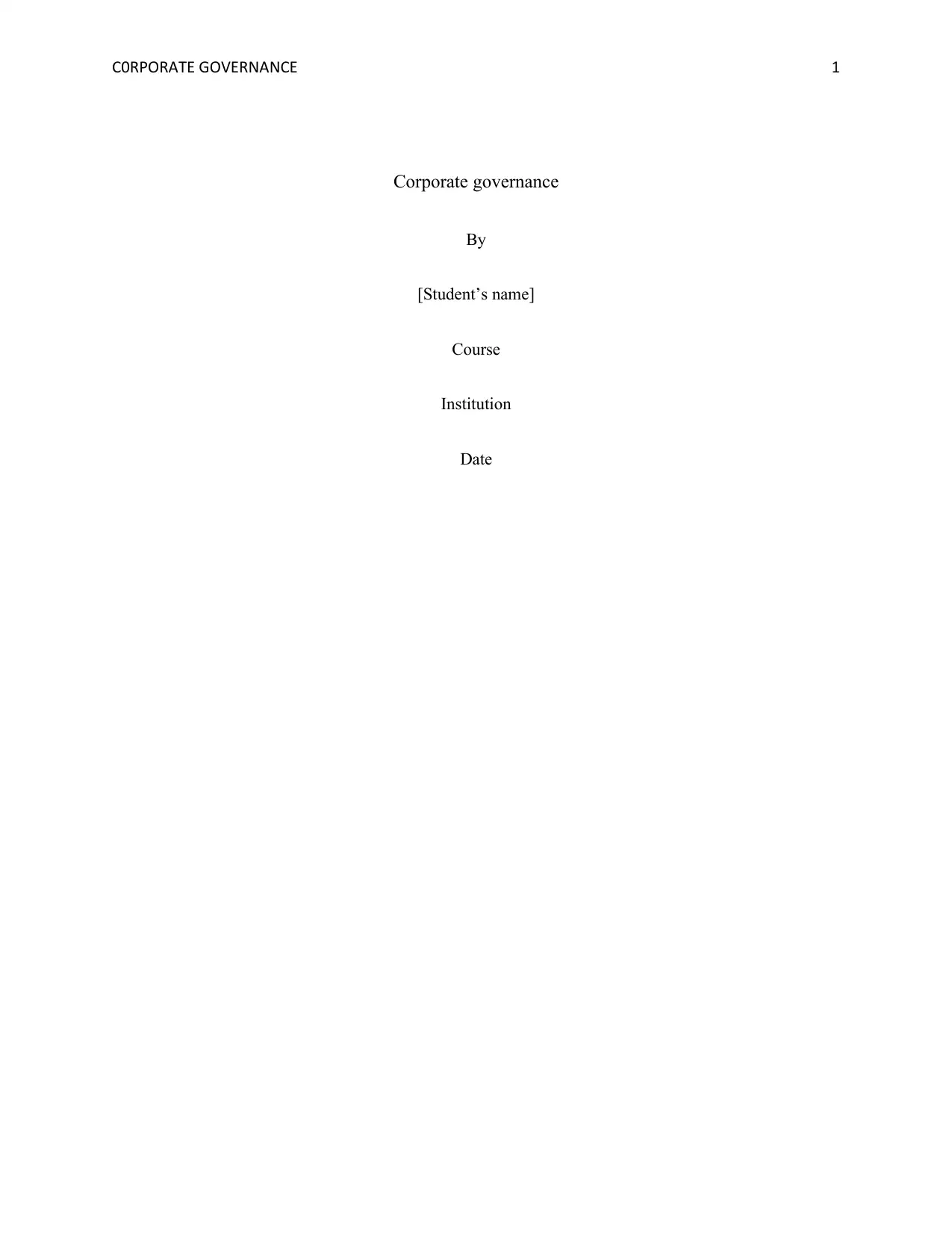
C0RPORATE GOVERNANCE 1
Corporate governance
By
[Student’s name]
Course
Institution
Date
Corporate governance
By
[Student’s name]
Course
Institution
Date
Paraphrase This Document
Need a fresh take? Get an instant paraphrase of this document with our AI Paraphraser
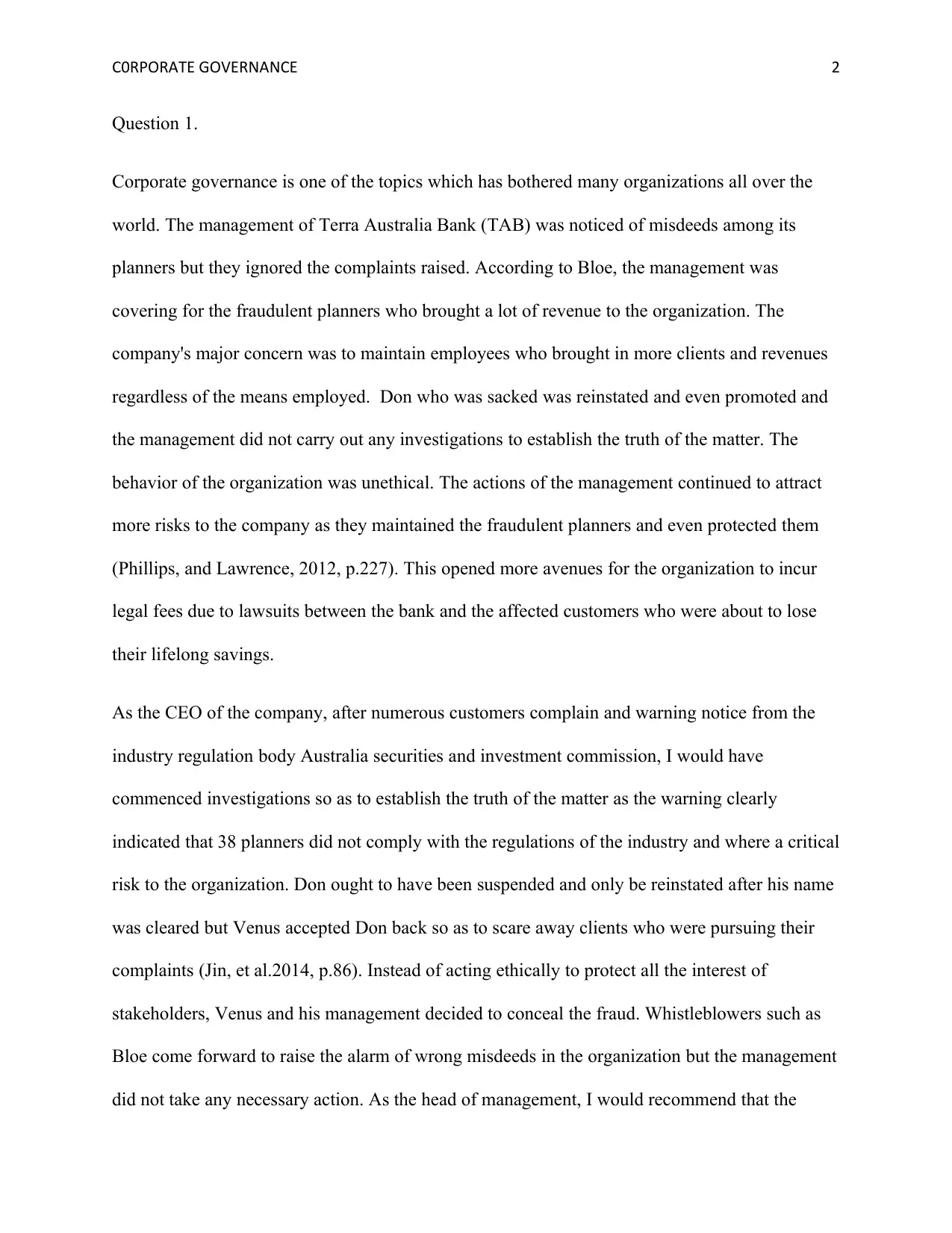
C0RPORATE GOVERNANCE 2
Question 1.
Corporate governance is one of the topics which has bothered many organizations all over the
world. The management of Terra Australia Bank (TAB) was noticed of misdeeds among its
planners but they ignored the complaints raised. According to Bloe, the management was
covering for the fraudulent planners who brought a lot of revenue to the organization. The
company's major concern was to maintain employees who brought in more clients and revenues
regardless of the means employed. Don who was sacked was reinstated and even promoted and
the management did not carry out any investigations to establish the truth of the matter. The
behavior of the organization was unethical. The actions of the management continued to attract
more risks to the company as they maintained the fraudulent planners and even protected them
(Phillips, and Lawrence, 2012, p.227). This opened more avenues for the organization to incur
legal fees due to lawsuits between the bank and the affected customers who were about to lose
their lifelong savings.
As the CEO of the company, after numerous customers complain and warning notice from the
industry regulation body Australia securities and investment commission, I would have
commenced investigations so as to establish the truth of the matter as the warning clearly
indicated that 38 planners did not comply with the regulations of the industry and where a critical
risk to the organization. Don ought to have been suspended and only be reinstated after his name
was cleared but Venus accepted Don back so as to scare away clients who were pursuing their
complaints (Jin, et al.2014, p.86). Instead of acting ethically to protect all the interest of
stakeholders, Venus and his management decided to conceal the fraud. Whistleblowers such as
Bloe come forward to raise the alarm of wrong misdeeds in the organization but the management
did not take any necessary action. As the head of management, I would recommend that the
Question 1.
Corporate governance is one of the topics which has bothered many organizations all over the
world. The management of Terra Australia Bank (TAB) was noticed of misdeeds among its
planners but they ignored the complaints raised. According to Bloe, the management was
covering for the fraudulent planners who brought a lot of revenue to the organization. The
company's major concern was to maintain employees who brought in more clients and revenues
regardless of the means employed. Don who was sacked was reinstated and even promoted and
the management did not carry out any investigations to establish the truth of the matter. The
behavior of the organization was unethical. The actions of the management continued to attract
more risks to the company as they maintained the fraudulent planners and even protected them
(Phillips, and Lawrence, 2012, p.227). This opened more avenues for the organization to incur
legal fees due to lawsuits between the bank and the affected customers who were about to lose
their lifelong savings.
As the CEO of the company, after numerous customers complain and warning notice from the
industry regulation body Australia securities and investment commission, I would have
commenced investigations so as to establish the truth of the matter as the warning clearly
indicated that 38 planners did not comply with the regulations of the industry and where a critical
risk to the organization. Don ought to have been suspended and only be reinstated after his name
was cleared but Venus accepted Don back so as to scare away clients who were pursuing their
complaints (Jin, et al.2014, p.86). Instead of acting ethically to protect all the interest of
stakeholders, Venus and his management decided to conceal the fraud. Whistleblowers such as
Bloe come forward to raise the alarm of wrong misdeeds in the organization but the management
did not take any necessary action. As the head of management, I would recommend that the
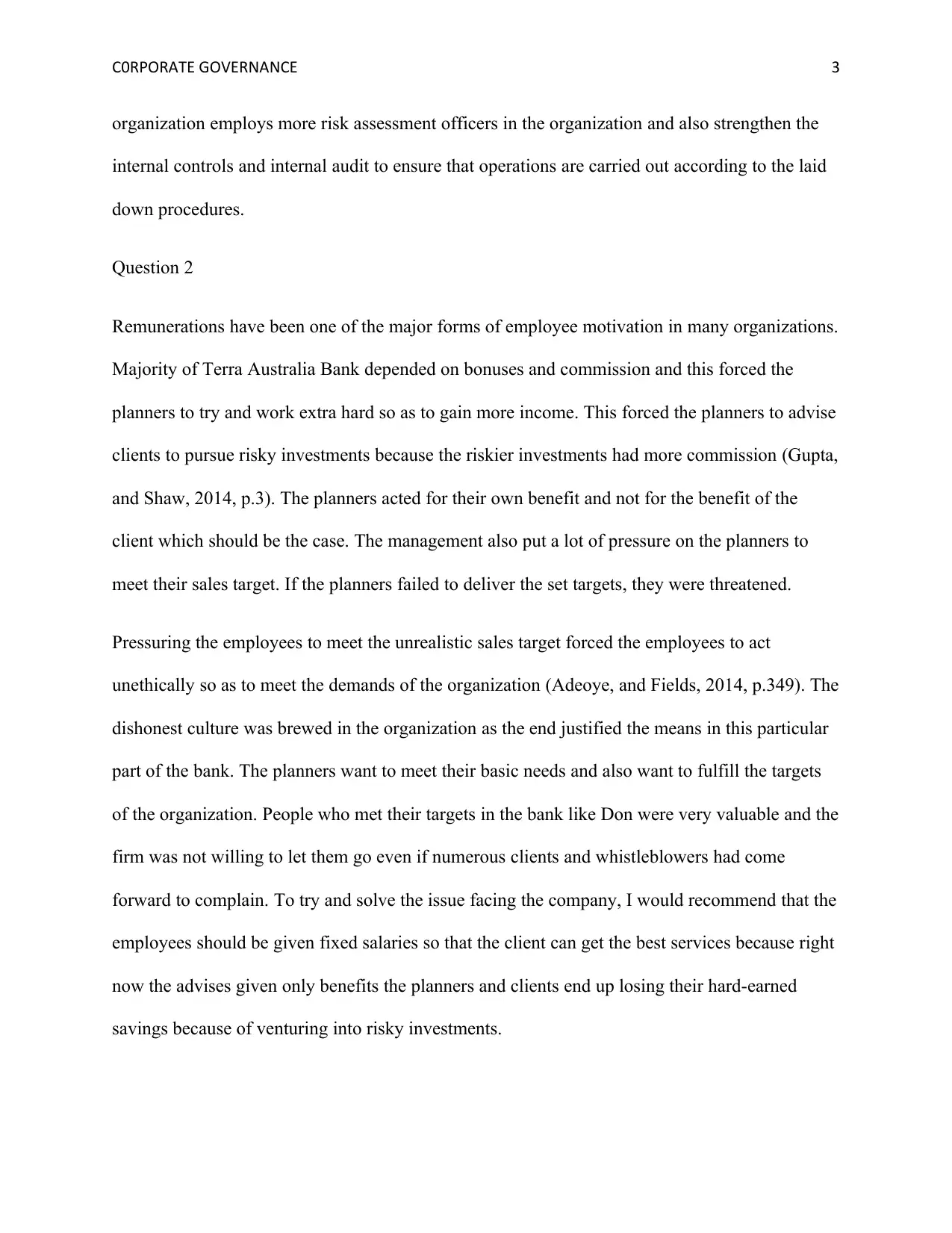
C0RPORATE GOVERNANCE 3
organization employs more risk assessment officers in the organization and also strengthen the
internal controls and internal audit to ensure that operations are carried out according to the laid
down procedures.
Question 2
Remunerations have been one of the major forms of employee motivation in many organizations.
Majority of Terra Australia Bank depended on bonuses and commission and this forced the
planners to try and work extra hard so as to gain more income. This forced the planners to advise
clients to pursue risky investments because the riskier investments had more commission (Gupta,
and Shaw, 2014, p.3). The planners acted for their own benefit and not for the benefit of the
client which should be the case. The management also put a lot of pressure on the planners to
meet their sales target. If the planners failed to deliver the set targets, they were threatened.
Pressuring the employees to meet the unrealistic sales target forced the employees to act
unethically so as to meet the demands of the organization (Adeoye, and Fields, 2014, p.349). The
dishonest culture was brewed in the organization as the end justified the means in this particular
part of the bank. The planners want to meet their basic needs and also want to fulfill the targets
of the organization. People who met their targets in the bank like Don were very valuable and the
firm was not willing to let them go even if numerous clients and whistleblowers had come
forward to complain. To try and solve the issue facing the company, I would recommend that the
employees should be given fixed salaries so that the client can get the best services because right
now the advises given only benefits the planners and clients end up losing their hard-earned
savings because of venturing into risky investments.
organization employs more risk assessment officers in the organization and also strengthen the
internal controls and internal audit to ensure that operations are carried out according to the laid
down procedures.
Question 2
Remunerations have been one of the major forms of employee motivation in many organizations.
Majority of Terra Australia Bank depended on bonuses and commission and this forced the
planners to try and work extra hard so as to gain more income. This forced the planners to advise
clients to pursue risky investments because the riskier investments had more commission (Gupta,
and Shaw, 2014, p.3). The planners acted for their own benefit and not for the benefit of the
client which should be the case. The management also put a lot of pressure on the planners to
meet their sales target. If the planners failed to deliver the set targets, they were threatened.
Pressuring the employees to meet the unrealistic sales target forced the employees to act
unethically so as to meet the demands of the organization (Adeoye, and Fields, 2014, p.349). The
dishonest culture was brewed in the organization as the end justified the means in this particular
part of the bank. The planners want to meet their basic needs and also want to fulfill the targets
of the organization. People who met their targets in the bank like Don were very valuable and the
firm was not willing to let them go even if numerous clients and whistleblowers had come
forward to complain. To try and solve the issue facing the company, I would recommend that the
employees should be given fixed salaries so that the client can get the best services because right
now the advises given only benefits the planners and clients end up losing their hard-earned
savings because of venturing into risky investments.
⊘ This is a preview!⊘
Do you want full access?
Subscribe today to unlock all pages.

Trusted by 1+ million students worldwide
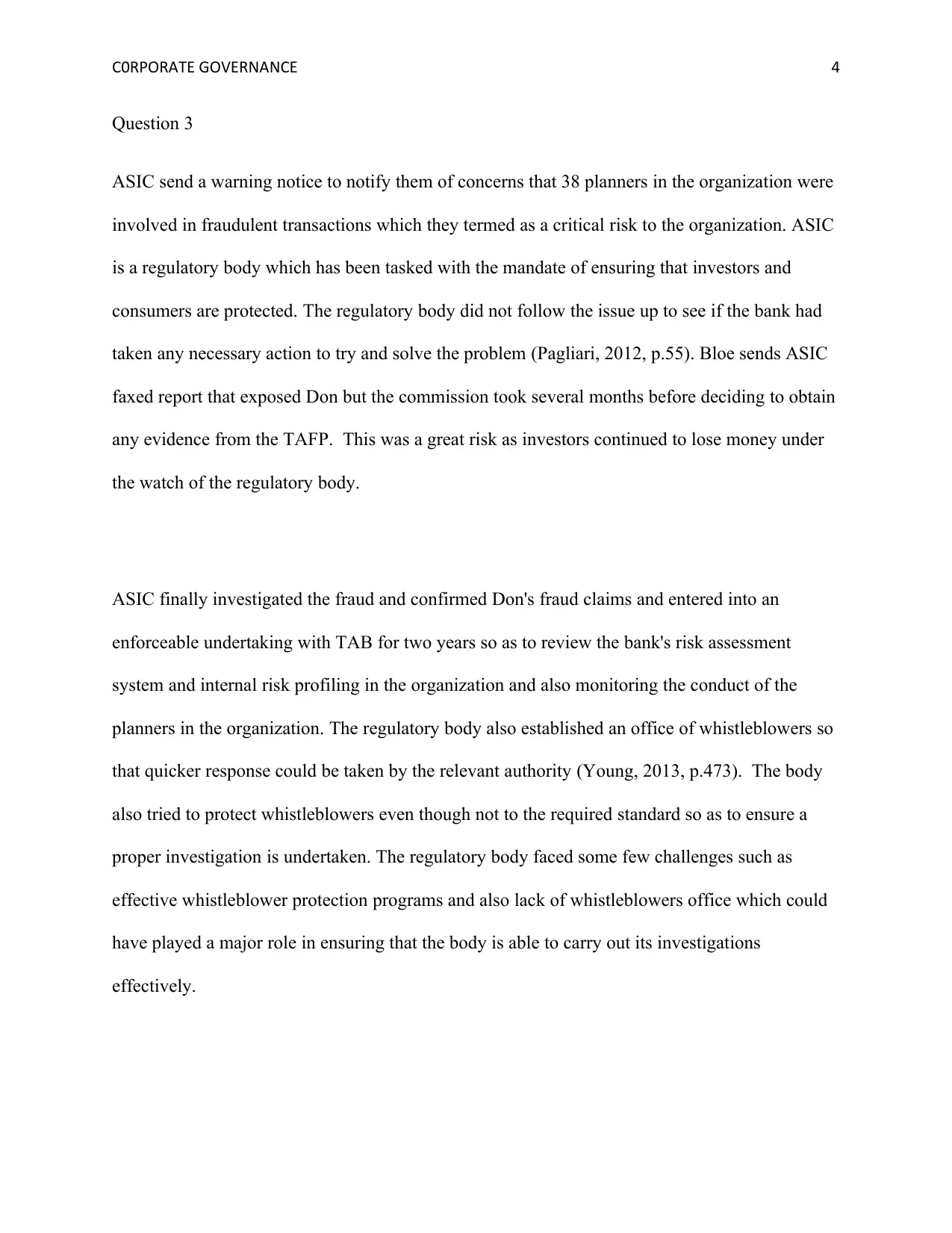
C0RPORATE GOVERNANCE 4
Question 3
ASIC send a warning notice to notify them of concerns that 38 planners in the organization were
involved in fraudulent transactions which they termed as a critical risk to the organization. ASIC
is a regulatory body which has been tasked with the mandate of ensuring that investors and
consumers are protected. The regulatory body did not follow the issue up to see if the bank had
taken any necessary action to try and solve the problem (Pagliari, 2012, p.55). Bloe sends ASIC
faxed report that exposed Don but the commission took several months before deciding to obtain
any evidence from the TAFP. This was a great risk as investors continued to lose money under
the watch of the regulatory body.
ASIC finally investigated the fraud and confirmed Don's fraud claims and entered into an
enforceable undertaking with TAB for two years so as to review the bank's risk assessment
system and internal risk profiling in the organization and also monitoring the conduct of the
planners in the organization. The regulatory body also established an office of whistleblowers so
that quicker response could be taken by the relevant authority (Young, 2013, p.473). The body
also tried to protect whistleblowers even though not to the required standard so as to ensure a
proper investigation is undertaken. The regulatory body faced some few challenges such as
effective whistleblower protection programs and also lack of whistleblowers office which could
have played a major role in ensuring that the body is able to carry out its investigations
effectively.
Question 3
ASIC send a warning notice to notify them of concerns that 38 planners in the organization were
involved in fraudulent transactions which they termed as a critical risk to the organization. ASIC
is a regulatory body which has been tasked with the mandate of ensuring that investors and
consumers are protected. The regulatory body did not follow the issue up to see if the bank had
taken any necessary action to try and solve the problem (Pagliari, 2012, p.55). Bloe sends ASIC
faxed report that exposed Don but the commission took several months before deciding to obtain
any evidence from the TAFP. This was a great risk as investors continued to lose money under
the watch of the regulatory body.
ASIC finally investigated the fraud and confirmed Don's fraud claims and entered into an
enforceable undertaking with TAB for two years so as to review the bank's risk assessment
system and internal risk profiling in the organization and also monitoring the conduct of the
planners in the organization. The regulatory body also established an office of whistleblowers so
that quicker response could be taken by the relevant authority (Young, 2013, p.473). The body
also tried to protect whistleblowers even though not to the required standard so as to ensure a
proper investigation is undertaken. The regulatory body faced some few challenges such as
effective whistleblower protection programs and also lack of whistleblowers office which could
have played a major role in ensuring that the body is able to carry out its investigations
effectively.
Paraphrase This Document
Need a fresh take? Get an instant paraphrase of this document with our AI Paraphraser
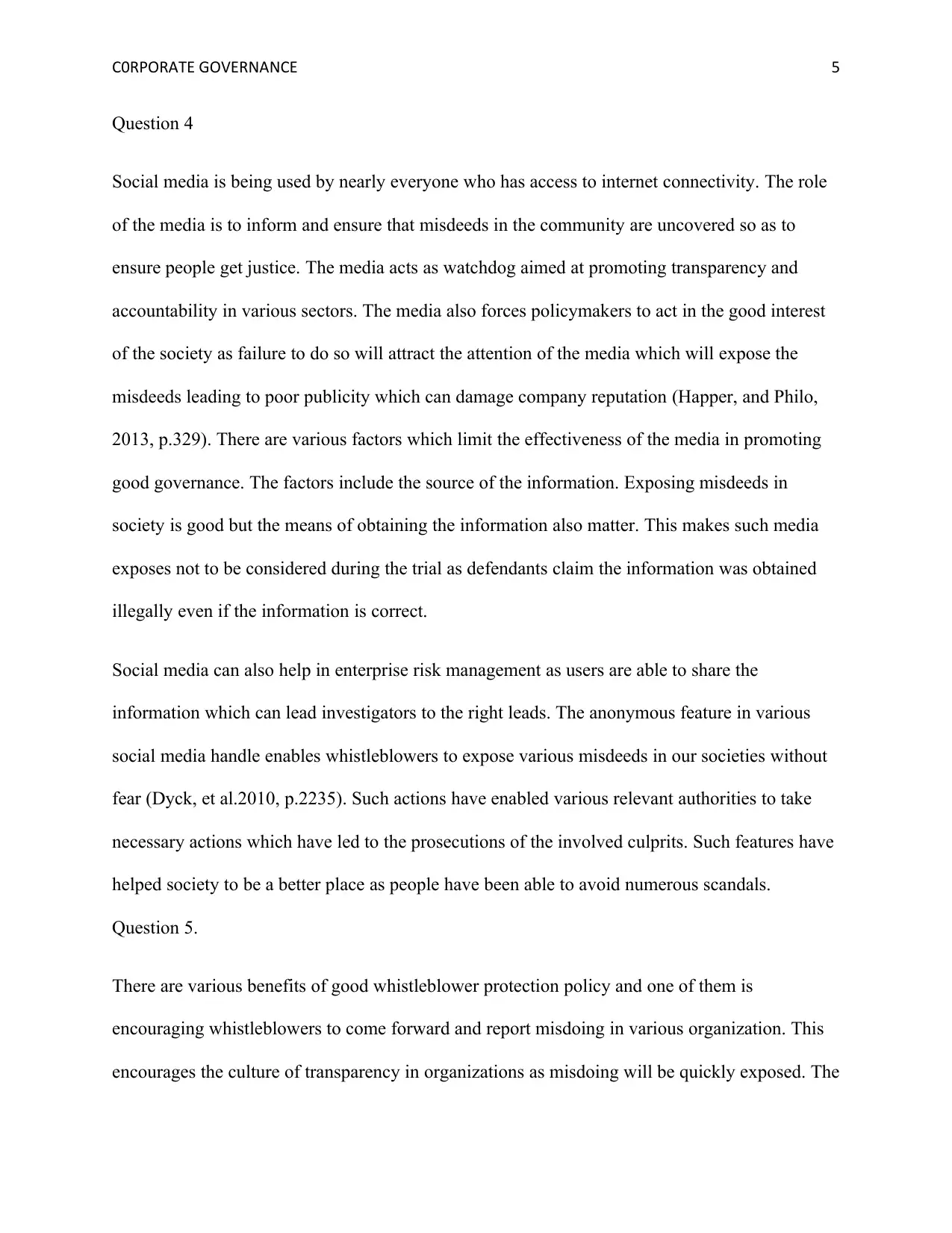
C0RPORATE GOVERNANCE 5
Question 4
Social media is being used by nearly everyone who has access to internet connectivity. The role
of the media is to inform and ensure that misdeeds in the community are uncovered so as to
ensure people get justice. The media acts as watchdog aimed at promoting transparency and
accountability in various sectors. The media also forces policymakers to act in the good interest
of the society as failure to do so will attract the attention of the media which will expose the
misdeeds leading to poor publicity which can damage company reputation (Happer, and Philo,
2013, p.329). There are various factors which limit the effectiveness of the media in promoting
good governance. The factors include the source of the information. Exposing misdeeds in
society is good but the means of obtaining the information also matter. This makes such media
exposes not to be considered during the trial as defendants claim the information was obtained
illegally even if the information is correct.
Social media can also help in enterprise risk management as users are able to share the
information which can lead investigators to the right leads. The anonymous feature in various
social media handle enables whistleblowers to expose various misdeeds in our societies without
fear (Dyck, et al.2010, p.2235). Such actions have enabled various relevant authorities to take
necessary actions which have led to the prosecutions of the involved culprits. Such features have
helped society to be a better place as people have been able to avoid numerous scandals.
Question 5.
There are various benefits of good whistleblower protection policy and one of them is
encouraging whistleblowers to come forward and report misdoing in various organization. This
encourages the culture of transparency in organizations as misdoing will be quickly exposed. The
Question 4
Social media is being used by nearly everyone who has access to internet connectivity. The role
of the media is to inform and ensure that misdeeds in the community are uncovered so as to
ensure people get justice. The media acts as watchdog aimed at promoting transparency and
accountability in various sectors. The media also forces policymakers to act in the good interest
of the society as failure to do so will attract the attention of the media which will expose the
misdeeds leading to poor publicity which can damage company reputation (Happer, and Philo,
2013, p.329). There are various factors which limit the effectiveness of the media in promoting
good governance. The factors include the source of the information. Exposing misdeeds in
society is good but the means of obtaining the information also matter. This makes such media
exposes not to be considered during the trial as defendants claim the information was obtained
illegally even if the information is correct.
Social media can also help in enterprise risk management as users are able to share the
information which can lead investigators to the right leads. The anonymous feature in various
social media handle enables whistleblowers to expose various misdeeds in our societies without
fear (Dyck, et al.2010, p.2235). Such actions have enabled various relevant authorities to take
necessary actions which have led to the prosecutions of the involved culprits. Such features have
helped society to be a better place as people have been able to avoid numerous scandals.
Question 5.
There are various benefits of good whistleblower protection policy and one of them is
encouraging whistleblowers to come forward and report misdoing in various organization. This
encourages the culture of transparency in organizations as misdoing will be quickly exposed. The
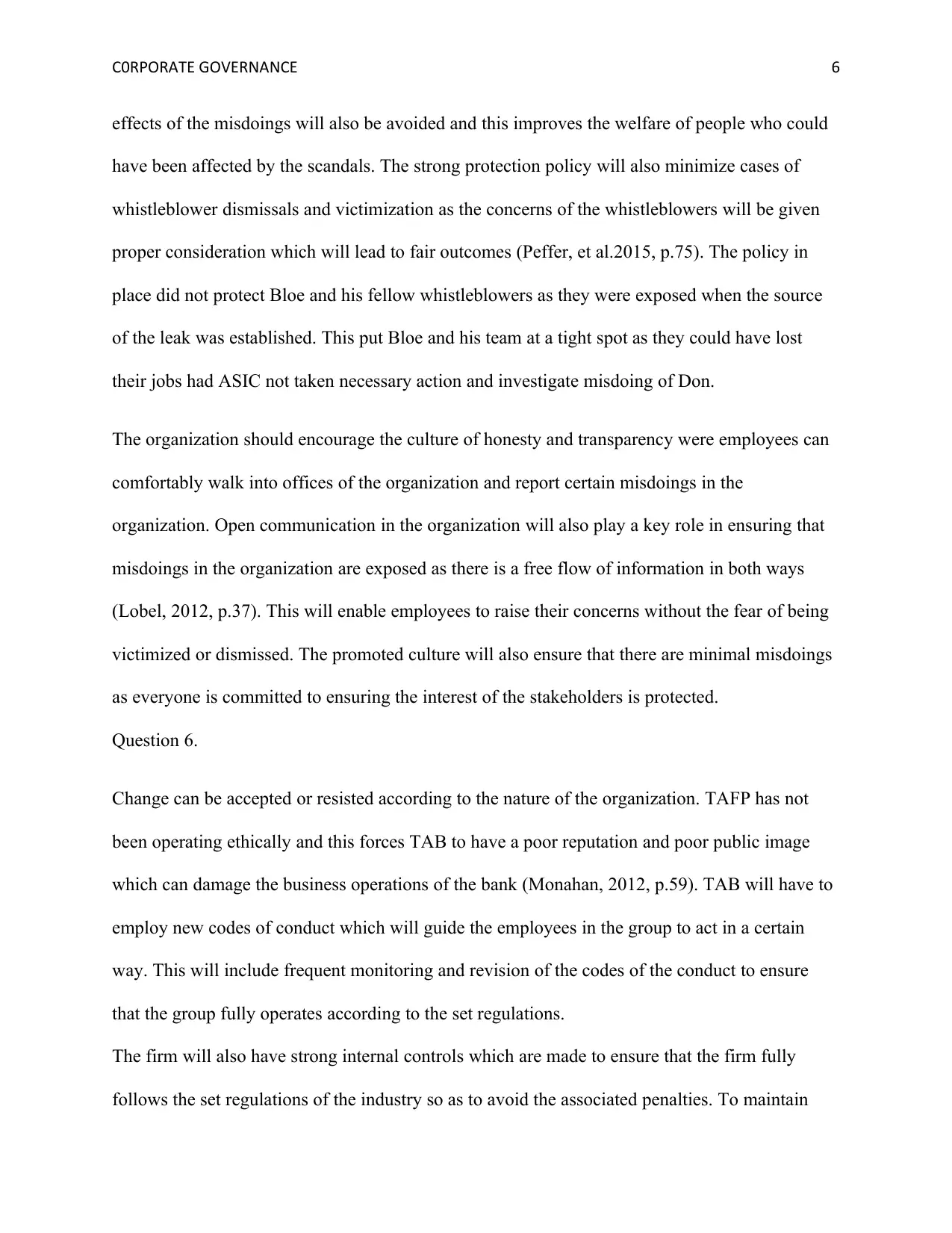
C0RPORATE GOVERNANCE 6
effects of the misdoings will also be avoided and this improves the welfare of people who could
have been affected by the scandals. The strong protection policy will also minimize cases of
whistleblower dismissals and victimization as the concerns of the whistleblowers will be given
proper consideration which will lead to fair outcomes (Peffer, et al.2015, p.75). The policy in
place did not protect Bloe and his fellow whistleblowers as they were exposed when the source
of the leak was established. This put Bloe and his team at a tight spot as they could have lost
their jobs had ASIC not taken necessary action and investigate misdoing of Don.
The organization should encourage the culture of honesty and transparency were employees can
comfortably walk into offices of the organization and report certain misdoings in the
organization. Open communication in the organization will also play a key role in ensuring that
misdoings in the organization are exposed as there is a free flow of information in both ways
(Lobel, 2012, p.37). This will enable employees to raise their concerns without the fear of being
victimized or dismissed. The promoted culture will also ensure that there are minimal misdoings
as everyone is committed to ensuring the interest of the stakeholders is protected.
Question 6.
Change can be accepted or resisted according to the nature of the organization. TAFP has not
been operating ethically and this forces TAB to have a poor reputation and poor public image
which can damage the business operations of the bank (Monahan, 2012, p.59). TAB will have to
employ new codes of conduct which will guide the employees in the group to act in a certain
way. This will include frequent monitoring and revision of the codes of the conduct to ensure
that the group fully operates according to the set regulations.
The firm will also have strong internal controls which are made to ensure that the firm fully
follows the set regulations of the industry so as to avoid the associated penalties. To maintain
effects of the misdoings will also be avoided and this improves the welfare of people who could
have been affected by the scandals. The strong protection policy will also minimize cases of
whistleblower dismissals and victimization as the concerns of the whistleblowers will be given
proper consideration which will lead to fair outcomes (Peffer, et al.2015, p.75). The policy in
place did not protect Bloe and his fellow whistleblowers as they were exposed when the source
of the leak was established. This put Bloe and his team at a tight spot as they could have lost
their jobs had ASIC not taken necessary action and investigate misdoing of Don.
The organization should encourage the culture of honesty and transparency were employees can
comfortably walk into offices of the organization and report certain misdoings in the
organization. Open communication in the organization will also play a key role in ensuring that
misdoings in the organization are exposed as there is a free flow of information in both ways
(Lobel, 2012, p.37). This will enable employees to raise their concerns without the fear of being
victimized or dismissed. The promoted culture will also ensure that there are minimal misdoings
as everyone is committed to ensuring the interest of the stakeholders is protected.
Question 6.
Change can be accepted or resisted according to the nature of the organization. TAFP has not
been operating ethically and this forces TAB to have a poor reputation and poor public image
which can damage the business operations of the bank (Monahan, 2012, p.59). TAB will have to
employ new codes of conduct which will guide the employees in the group to act in a certain
way. This will include frequent monitoring and revision of the codes of the conduct to ensure
that the group fully operates according to the set regulations.
The firm will also have strong internal controls which are made to ensure that the firm fully
follows the set regulations of the industry so as to avoid the associated penalties. To maintain
⊘ This is a preview!⊘
Do you want full access?
Subscribe today to unlock all pages.

Trusted by 1+ million students worldwide
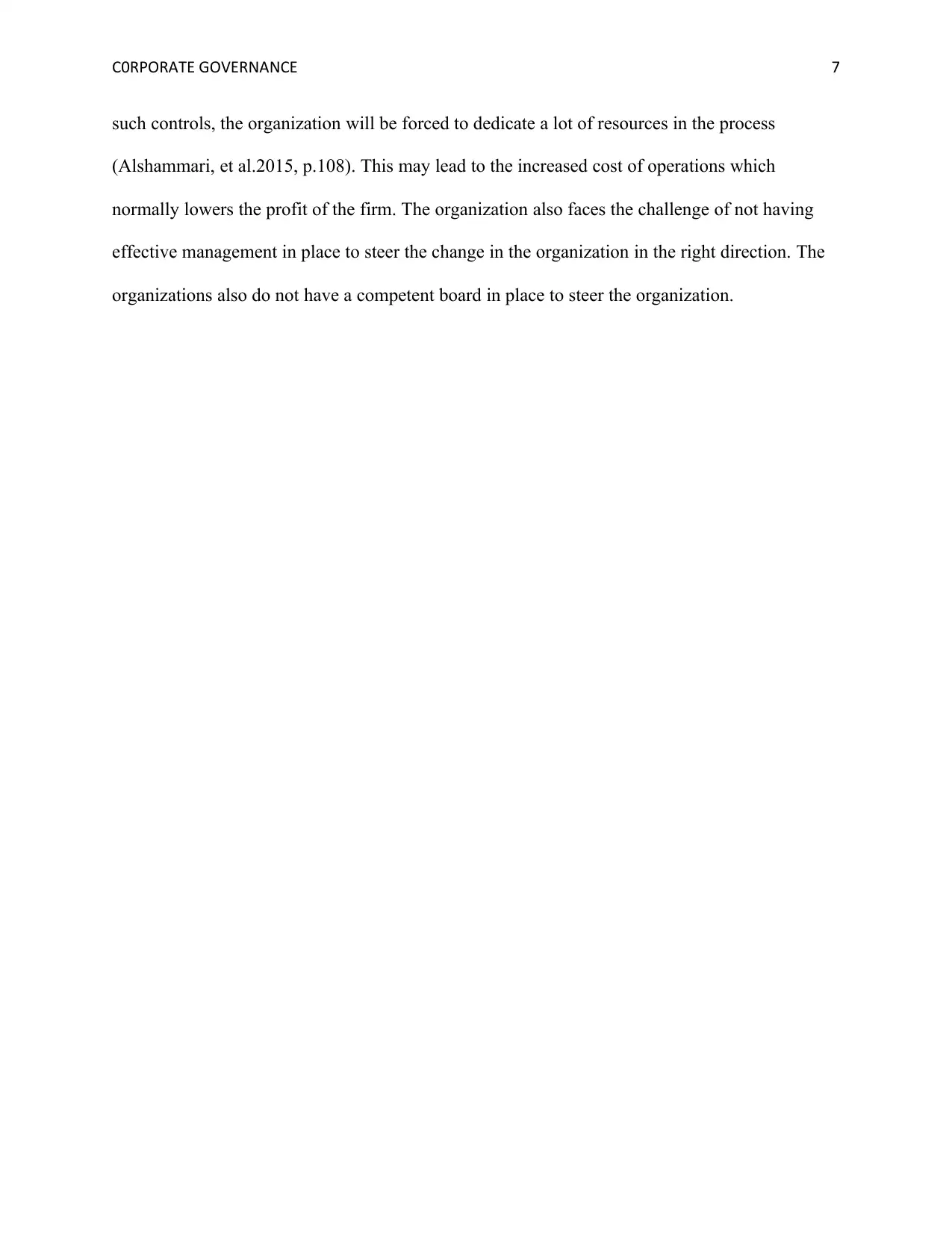
C0RPORATE GOVERNANCE 7
such controls, the organization will be forced to dedicate a lot of resources in the process
(Alshammari, et al.2015, p.108). This may lead to the increased cost of operations which
normally lowers the profit of the firm. The organization also faces the challenge of not having
effective management in place to steer the change in the organization in the right direction. The
organizations also do not have a competent board in place to steer the organization.
such controls, the organization will be forced to dedicate a lot of resources in the process
(Alshammari, et al.2015, p.108). This may lead to the increased cost of operations which
normally lowers the profit of the firm. The organization also faces the challenge of not having
effective management in place to steer the change in the organization in the right direction. The
organizations also do not have a competent board in place to steer the organization.
Paraphrase This Document
Need a fresh take? Get an instant paraphrase of this document with our AI Paraphraser
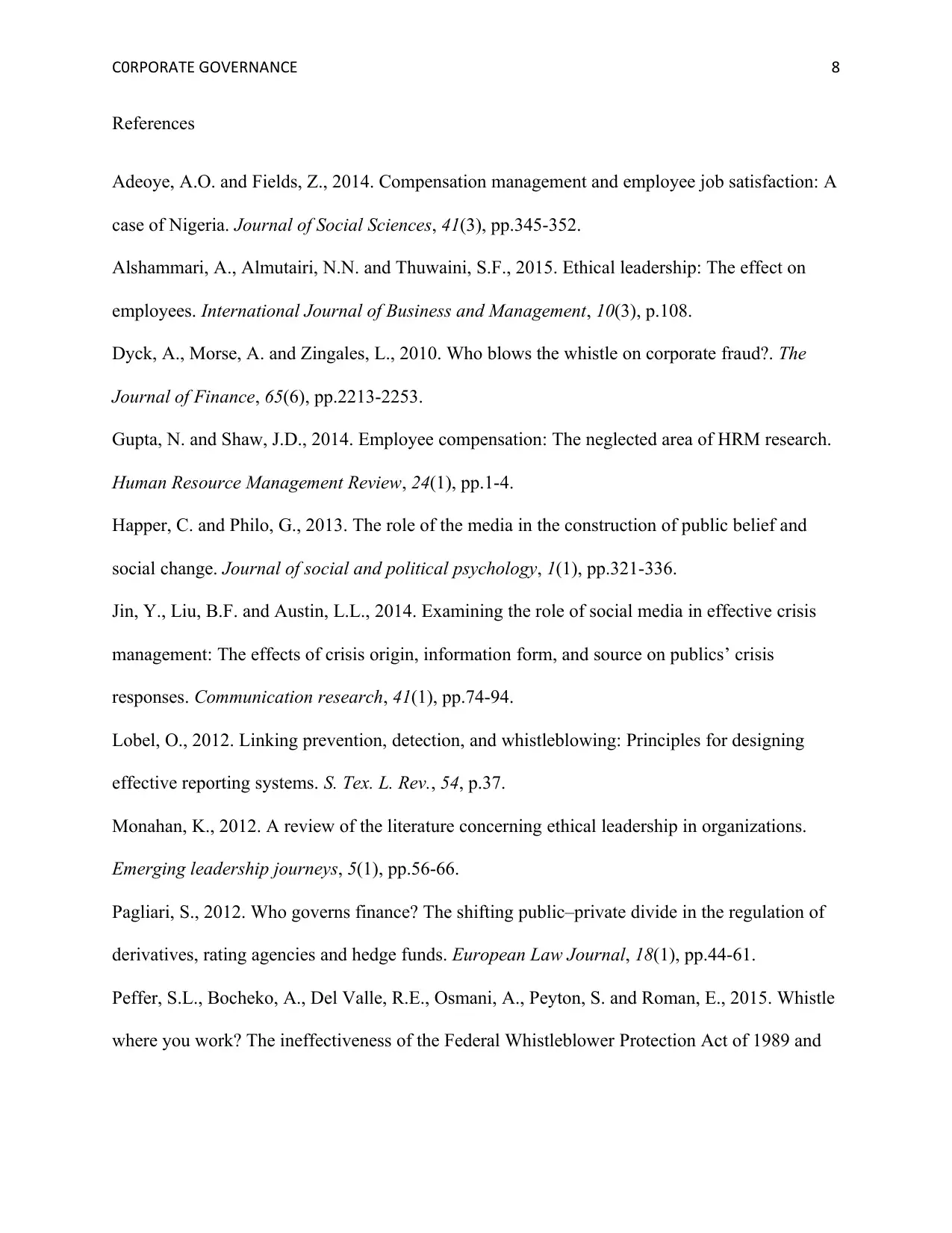
C0RPORATE GOVERNANCE 8
References
Adeoye, A.O. and Fields, Z., 2014. Compensation management and employee job satisfaction: A
case of Nigeria. Journal of Social Sciences, 41(3), pp.345-352.
Alshammari, A., Almutairi, N.N. and Thuwaini, S.F., 2015. Ethical leadership: The effect on
employees. International Journal of Business and Management, 10(3), p.108.
Dyck, A., Morse, A. and Zingales, L., 2010. Who blows the whistle on corporate fraud?. The
Journal of Finance, 65(6), pp.2213-2253.
Gupta, N. and Shaw, J.D., 2014. Employee compensation: The neglected area of HRM research.
Human Resource Management Review, 24(1), pp.1-4.
Happer, C. and Philo, G., 2013. The role of the media in the construction of public belief and
social change. Journal of social and political psychology, 1(1), pp.321-336.
Jin, Y., Liu, B.F. and Austin, L.L., 2014. Examining the role of social media in effective crisis
management: The effects of crisis origin, information form, and source on publics’ crisis
responses. Communication research, 41(1), pp.74-94.
Lobel, O., 2012. Linking prevention, detection, and whistleblowing: Principles for designing
effective reporting systems. S. Tex. L. Rev., 54, p.37.
Monahan, K., 2012. A review of the literature concerning ethical leadership in organizations.
Emerging leadership journeys, 5(1), pp.56-66.
Pagliari, S., 2012. Who governs finance? The shifting public–private divide in the regulation of
derivatives, rating agencies and hedge funds. European Law Journal, 18(1), pp.44-61.
Peffer, S.L., Bocheko, A., Del Valle, R.E., Osmani, A., Peyton, S. and Roman, E., 2015. Whistle
where you work? The ineffectiveness of the Federal Whistleblower Protection Act of 1989 and
References
Adeoye, A.O. and Fields, Z., 2014. Compensation management and employee job satisfaction: A
case of Nigeria. Journal of Social Sciences, 41(3), pp.345-352.
Alshammari, A., Almutairi, N.N. and Thuwaini, S.F., 2015. Ethical leadership: The effect on
employees. International Journal of Business and Management, 10(3), p.108.
Dyck, A., Morse, A. and Zingales, L., 2010. Who blows the whistle on corporate fraud?. The
Journal of Finance, 65(6), pp.2213-2253.
Gupta, N. and Shaw, J.D., 2014. Employee compensation: The neglected area of HRM research.
Human Resource Management Review, 24(1), pp.1-4.
Happer, C. and Philo, G., 2013. The role of the media in the construction of public belief and
social change. Journal of social and political psychology, 1(1), pp.321-336.
Jin, Y., Liu, B.F. and Austin, L.L., 2014. Examining the role of social media in effective crisis
management: The effects of crisis origin, information form, and source on publics’ crisis
responses. Communication research, 41(1), pp.74-94.
Lobel, O., 2012. Linking prevention, detection, and whistleblowing: Principles for designing
effective reporting systems. S. Tex. L. Rev., 54, p.37.
Monahan, K., 2012. A review of the literature concerning ethical leadership in organizations.
Emerging leadership journeys, 5(1), pp.56-66.
Pagliari, S., 2012. Who governs finance? The shifting public–private divide in the regulation of
derivatives, rating agencies and hedge funds. European Law Journal, 18(1), pp.44-61.
Peffer, S.L., Bocheko, A., Del Valle, R.E., Osmani, A., Peyton, S. and Roman, E., 2015. Whistle
where you work? The ineffectiveness of the Federal Whistleblower Protection Act of 1989 and
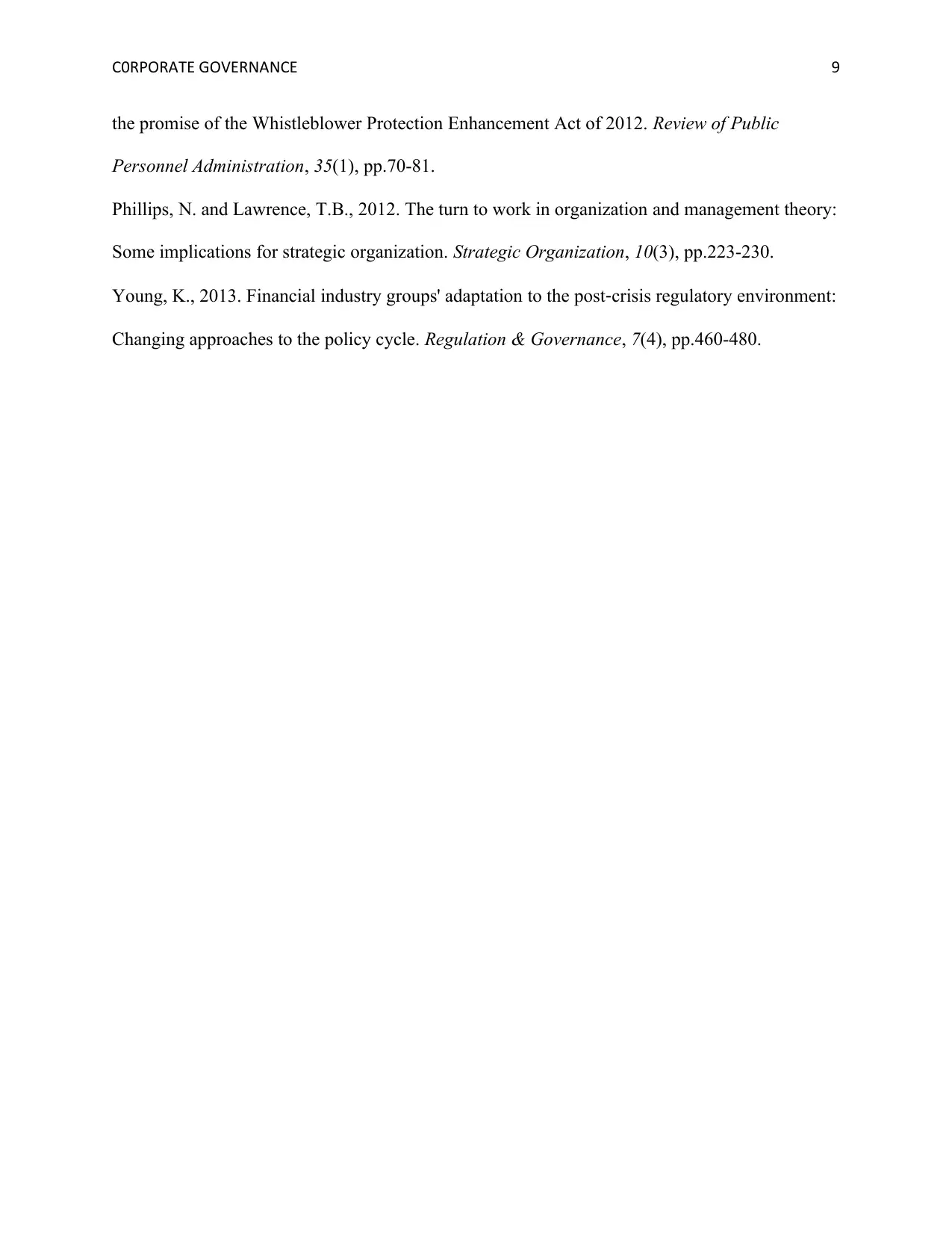
C0RPORATE GOVERNANCE 9
the promise of the Whistleblower Protection Enhancement Act of 2012. Review of Public
Personnel Administration, 35(1), pp.70-81.
Phillips, N. and Lawrence, T.B., 2012. The turn to work in organization and management theory:
Some implications for strategic organization. Strategic Organization, 10(3), pp.223-230.
Young, K., 2013. Financial industry groups' adaptation to the post‐crisis regulatory environment:
Changing approaches to the policy cycle. Regulation & Governance, 7(4), pp.460-480.
the promise of the Whistleblower Protection Enhancement Act of 2012. Review of Public
Personnel Administration, 35(1), pp.70-81.
Phillips, N. and Lawrence, T.B., 2012. The turn to work in organization and management theory:
Some implications for strategic organization. Strategic Organization, 10(3), pp.223-230.
Young, K., 2013. Financial industry groups' adaptation to the post‐crisis regulatory environment:
Changing approaches to the policy cycle. Regulation & Governance, 7(4), pp.460-480.
⊘ This is a preview!⊘
Do you want full access?
Subscribe today to unlock all pages.

Trusted by 1+ million students worldwide
1 out of 9
Your All-in-One AI-Powered Toolkit for Academic Success.
+13062052269
info@desklib.com
Available 24*7 on WhatsApp / Email
![[object Object]](/_next/static/media/star-bottom.7253800d.svg)
Unlock your academic potential
Copyright © 2020–2025 A2Z Services. All Rights Reserved. Developed and managed by ZUCOL.

